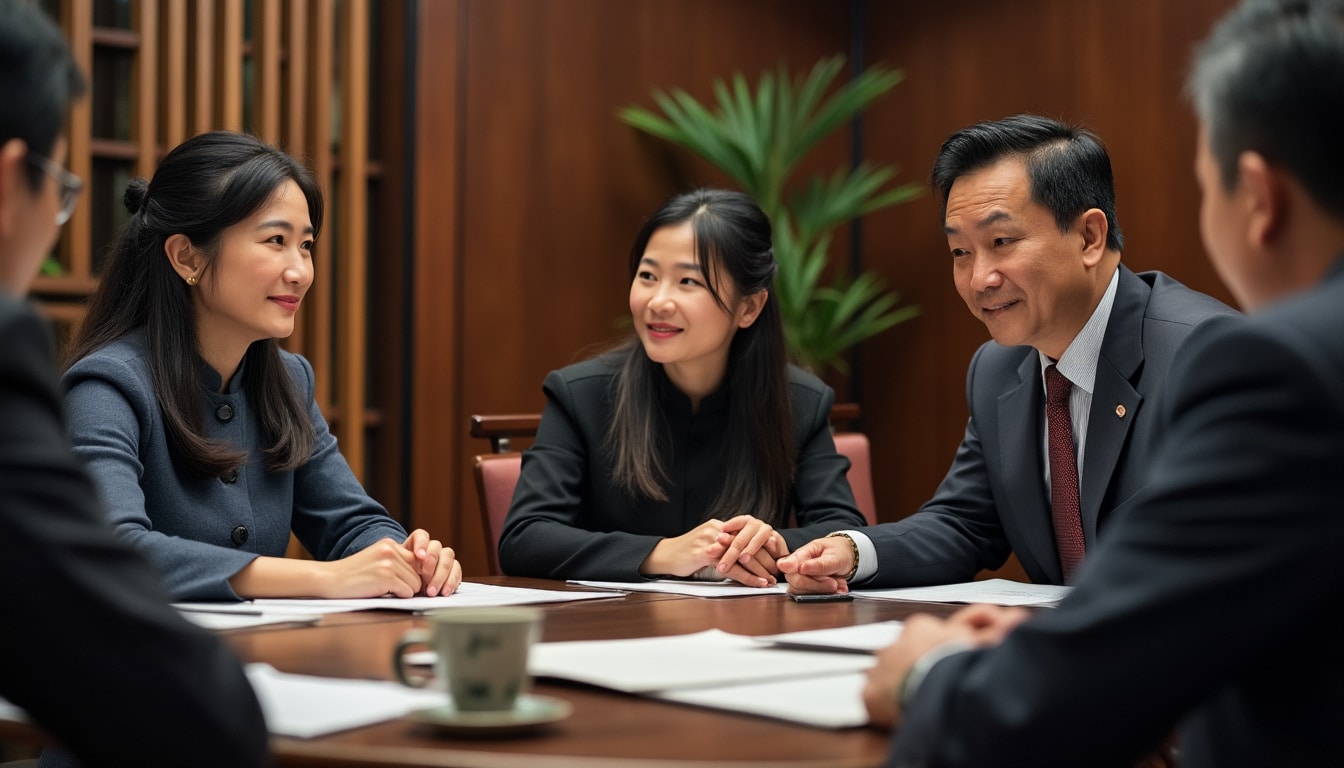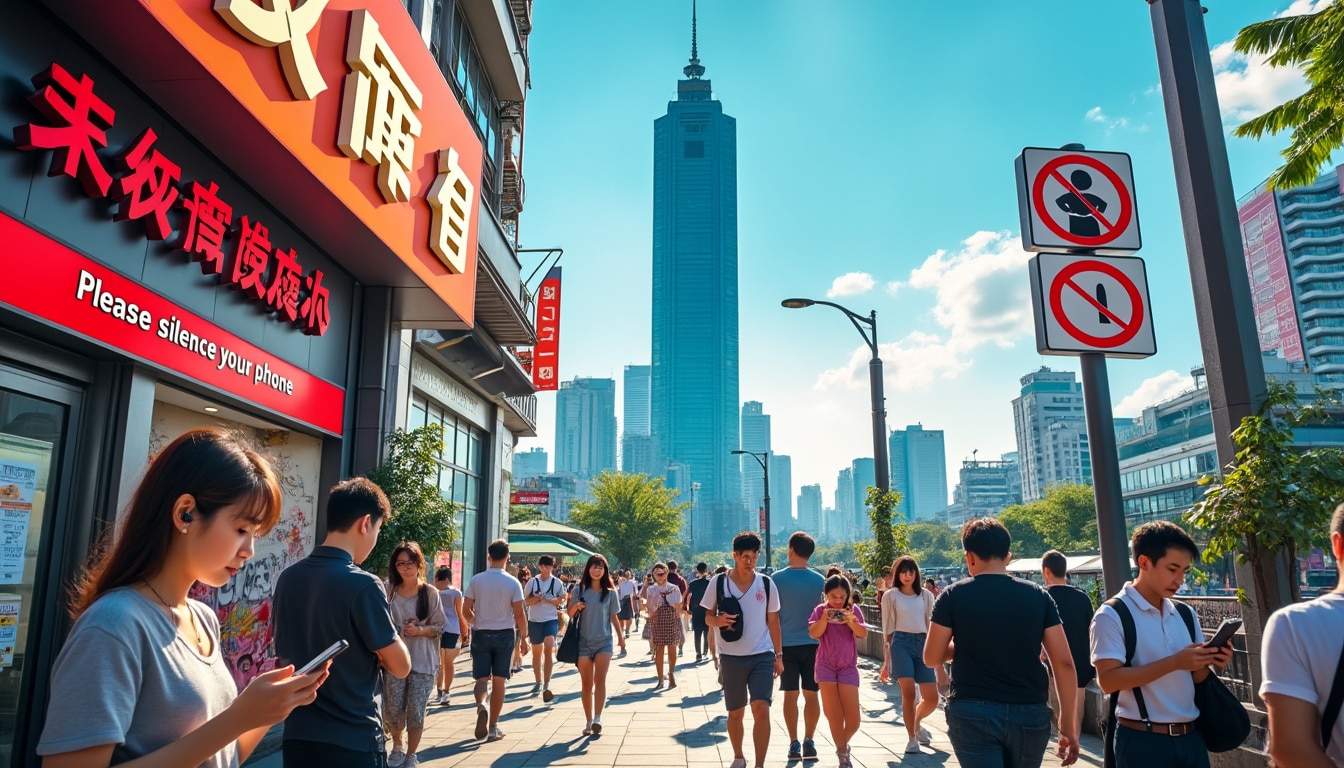Taipei, a bustling city blending rich history with modern innovation, stands as a beacon of culture and commerce in Asia. Navigating this dynamic landscape requires more than just knowing landmarks; understanding the intricate calling and communication rules can make a significant difference in personal and business interactions. This article presents a comprehensive guide to these rules, essential for both visitors and residents wishing to master the art of effective communication in Taipei. From understanding the unique cultural nuances to getting familiar with local telecom services, dive into the essential aspects of Taipei’s communication etiquette.
Understanding Communication Etiquette in Taipei
In Taipei, communication goes beyond simply exchanging words. It’s a multifaceted process deeply rooted in cultural values and traditions that significantly influence both personal and professional interactions. The city reflects a blend of Confucian principles, emphasizing respect, humility, and a strong group orientation, which are evident in its communication style. Understanding these elements is crucial for anyone wishing to navigate the Taipei cultural landscape effectively.
Indirect Communication: One hallmark of communication in Taipei is its indirectness. Direct confrontation or blunt expressions are often avoided in favor of a more harmonious exchange. This is not to say that Taipei’s residents shy away from difficult topics, but rather they approach communication with tact and diplomacy. Using indirect language can be a gesture of respect, allowing both parties to save face and maintain positive relationships.
Nonverbal Cues: Another vital component of communication in Taipei is the use of nonverbal cues such as gestures, facial expressions, and body language. These subtle signals can convey agreement, disagreement, or doubt without spoken words. A slight nod might indicate approval, while a pause could suggest hesitation. Being attuned to these cues can provide deeper insights into the interaction and enhance mutual understanding.
Hierarchy and Politeness: Communication in Taipei is also greatly influenced by social hierarchy. Showing deference to elders and authority figures through language is standard practice. Addressing individuals by their titles or using honorifics is common, and it’s essential to follow these protocols to avoid unintentional disrespect.
For newcomers, mastering these forms of communication might initially seem complex. However, embracing these cultural aspects not only smoothens interactions but also aligns with the broader societal respect for tradition and collectivism.

Effective Business Communication Strategies
Engaging in business discussions in Taipei requires a focused understanding of local customs and practices. Here are key strategies to ensure effective communication in business settings:
- ✨ Formal Introductions: Start meetings with formal introductions, acknowledging titles and roles. It shows respect and sets a professional tone for the meeting.
- ✨ Listening Actively: Demonstrating that you are listening attentively is crucial. It shows respect and a willingness to understand the perspectives of Taiwanese colleagues.
- ✨ Use of Diplomatic Language: Employing carefully phrased language can diffuse tension and foster a more cooperative dialogue.
- ✨ Building Relational Ties: Newcomers should invest time in relationship-building activities before jumping into negotiations. This practice aligns with the concept of ‘guanxi,’ the interconnected personal networks that ease business transactions.
- ✨ Avoiding Humor Initially: As humor can easily be lost in translation and might even offend, it’s advisable to steer clear of jokes until a more personal relationship has been established.
Following these strategies will not only improve communication but also contribute to forming a robust professional network in Taipei, essential for long-term success.
Getting to Know Taipei’s Telecom Landscape
A crucial aspect of communication in Taipei involves understanding the city’s telecom infrastructure. Several key players dominate this landscape, providing extensive coverage and a variety of plans tailored to different needs.
Leading Telecom Providers: Taipei is served by several prominent telecom companies, each offering unique services and packages suited to residents and travelers:
- 📞 Chunghwa Telecom: As Taiwan’s largest telecom service provider, Chunghwa Telecom offers reliable coverage and a wide range of mobile and internet services, making it a solid choice for both domestic and international users.
- 📞 FarEasTone: Known for its competitively priced packages, FarEasTone provides excellent options for tourists, especially for short-term stays.
- 📞 Taiwan Mobile: This provider is renowned for its innovative services and customer satisfaction, offering flexible plans that cater to individual needs.
- 📞 Hinet: Commonly used for broadband internet, Hinet is a subsidiary of Chunghwa Telecom, providing robust internet solutions throughout the city.
- 📞 T-Star: Also known as Taiwan Star, this newer player in the telecom field offers appealing promotions and packages aimed at younger demographics and budget-conscious users.
- 📞 Vibo Telecom: Although smaller, Vibo Telecom provides tailored solutions for specific customer groups, offering unique plans that might appeal to niche markets.
Understanding these providers and their respective strengths is critical in making informed decisions about telecom services in Taipei.
| Provider | Special Features | Best For |
|---|---|---|
| Chunghwa Telecom | Extensive Coverage, Wide Service Range | International Visitors |
| FarEasTone | Competitive Pricing | Tourists |
| Taiwan Mobile | Innovative Plans | Local Residents |
| Hinet | Broadband Solutions | Business, Households |
| T-Star | Youth-Centric Offers | Younger Demographics |
| Vibo Telecom | Niche Solutions | Specific Users |
With this understanding, whether one is staying in Taipei short-term or planning to make it home, finding a fitting telecom service becomes more streamlined, ensuring seamless connectivity.
The Importance of Etiquette in Digital Communication
In today’s interconnected world, digital communication has become an integral part of daily life in Taipei. As technology continues to evolve, adapting to digital communication etiquette is as critical as mastering face-to-face interactions.
Zoom and Online Meetings: With the proliferation of virtual meetings, showing respect through digital channels has become imperative. In Taipei, it’s customary to turn on cameras during online meetings to mirror face-to-face interactions. This simple act conveys engagement and respect for the attendees.
Punctuality: Whether in physical or digital settings, punctuality is highly regarded in Taiwanese culture. Being on time for virtual conferences shows respect for others’ time and reflects a professional attitude.
Email Etiquette: Emails in a business context should maintain a formal tone. Using proper salutations, keeping the message clear and concise, and ending with a courteous closing phrase are essential practices. Acknowledging receipt promptly also plays a significant role in demonstrating professionalism.
Instant Messaging: While platforms like LINE and WhatsApp are popular, it is important to stay mindful of message tone and context. Professional interactions should avoid excessive casual language, ensuring messages remain respectful and appropriate.
Understanding these subtle digital etiquettes not only enhances professional image but also fosters smooth communication across various platforms, encouraging effective and meaningful exchanges.
The Role of Language in Communication
The linguistic landscape of Taipei offers a rich tapestry of languages, primarily Mandarin, Taiwanese Hokkien, and English. For effective communication, acknowledging this diversity is essential.
Mandarin Proficiency: While English is widely spoken in business circles, a basic understanding of Mandarin can significantly enhance interactions. Simple phrases such as “nǐ hǎo” (hello), “xièxiè” (thank you), and “bù hǎo yì si” (sorry) can bridge cultural gaps, showing respect and willingness to engage earnestly.
Using English: Many locals, especially younger generations and business professionals, are conversant in English, which facilitates communication for international visitors. Still, showing an effort to learn local phrases often leaves a positive impression.
Cultural Language Nuances: Related to language, nuances such as tone and context play crucial roles in ensuring messages are received as intended. Understanding the subtleties can prevent misunderstandings and foster more harmonious exchanges.
Avoiding common pitfalls, such as directly translating phrases or underestimating the power of non-verbal cues, can enhance both personal and professional interactions in Taipei.
.table-wrapper {
overflow-x: auto;
}
| Language | Usage Context | Proficiency Importance |
|---|---|---|
| Mandarin | Business, Daily Interactions | High |
| English | Business, Education | Moderate |
| Taiwanese Hokkien | Local Interactions | Low-Moderate |
Mastering language aspects is not just about improving communication but also about embracing Taipei’s rich cultural diversity, enriching the experience of living or working in this vibrant city.
Explore Taipei’s Linguistic Diversity
Language and Spelling in Taipei
Unusual Facts and Social Issues in Taipei
Understanding Emergency Communication Channels
Knowing how to communicate during emergencies is paramount for anyone residing or traveling in Taipei. The city has established efficient systems to ensure swift responses to crises, whether related to health, safety, or natural disasters.
Emergency Numbers: Taipei’s emergency services are incredibly efficient, but knowing the correct numbers is essential for quick assistance. The general emergency number is 110 for the police and 119 for fire or medical emergencies—crucial numbers to keep at your fingertips.
- 🚓 Police: 110
- 🚑 Fire & Ambulance: 119
Emergency Alerts: The city’s residents can receive emergency alerts via mobile networks, courtesy of major providers like Chunghwa Telecom and FarEasTone, who ensure these alerts are relayed promptly to subscribers.
Language Considerations: It’s advisable to know some essential phrases in Mandarin to communicate emergencies effectively. Dispatchers in Taipei can often handle English calls, but using Mandarin might expedite response times in critical situations.
For more on communication strategies and telecom services, refer to the local telecom guides and understand service specifics, especially when selecting emergency contacts on your devices. This basic preparedness might be a lifesaver in unforeseen situations.
Finally, integrating these communication practices ensures safety and foster seamless experiences when living or traveling anywhere in Taipei.
Frequently Asked Questions
Q1: What are the main telecom providers in Taipei?
A1: The primary providers include Chunghwa Telecom, Taiwan Mobile, FarEasTone, and T-Star.
Q2: How can I improve my Mandarin for business in Taipei?
A2: Engaging with local language classes, apps, or language exchange programs can be very helpful.
Q3: What should I do in case of a medical emergency in Taipei?
A3: Dial 119 for immediate medical assistance, essential for emergencies handled with urgency in Taipei.

Legal Information and Rules in Taipei
When navigating the dynamic cityscape of Taipei, understanding the legal system and its rules is crucial for both residents and visitors. Taipei’s legal structure reflects a blend of historical influences and modern advancements, designed to maintain order and justice in…

Criminal status and entry to Taipei
Understanding laws and regulations can be a daunting task, especially when they influence one’s ability to travel internationally. For those considering a trip to Taipei, the vibrant capital of Taiwan, it’s crucial to be aware of how a criminal record…

Drinking and age restrictions in Taipei
The conversation around drinking and age restrictions in Taipei is a complex and evolving topic, shaped by both cultural nuances and public health concerns. While the legal drinking age in Taiwan is currently set at 18, there are growing calls…

In recent years, Taipei has become a bustling hub of activity and excitement, particularly during the holiday season. As the legislation regarding public holidays undergoes significant changes, both residents and travelers should be well-informed about what this means for experiencing…

Moving to Taipei, the bustling capital city of Taiwan, is an adventure filled with vibrant city life, delicious street food, and a thriving cultural scene. However, relocating comes with its own set of challenges, especially when it comes to navigating…

Smoking, drugs, and red light laws in Taipei
In the vibrant city of Taipei, where modernity meets traditional charm, the legal landscape surrounding smoking, drugs, and the red-light district is evolving. The bustling streets offer a unique blend of cultural experiences, but understanding the local legal frame can…

Social and discrimination issues in Taipei
As Taiwan continues to progress in various social avenues, the capital, Taipei, finds itself at the crossroads of modernity and tradition. Social justice and discrimination issues are topics of growing importance in the city, as cultural and demographic shifts mold…

